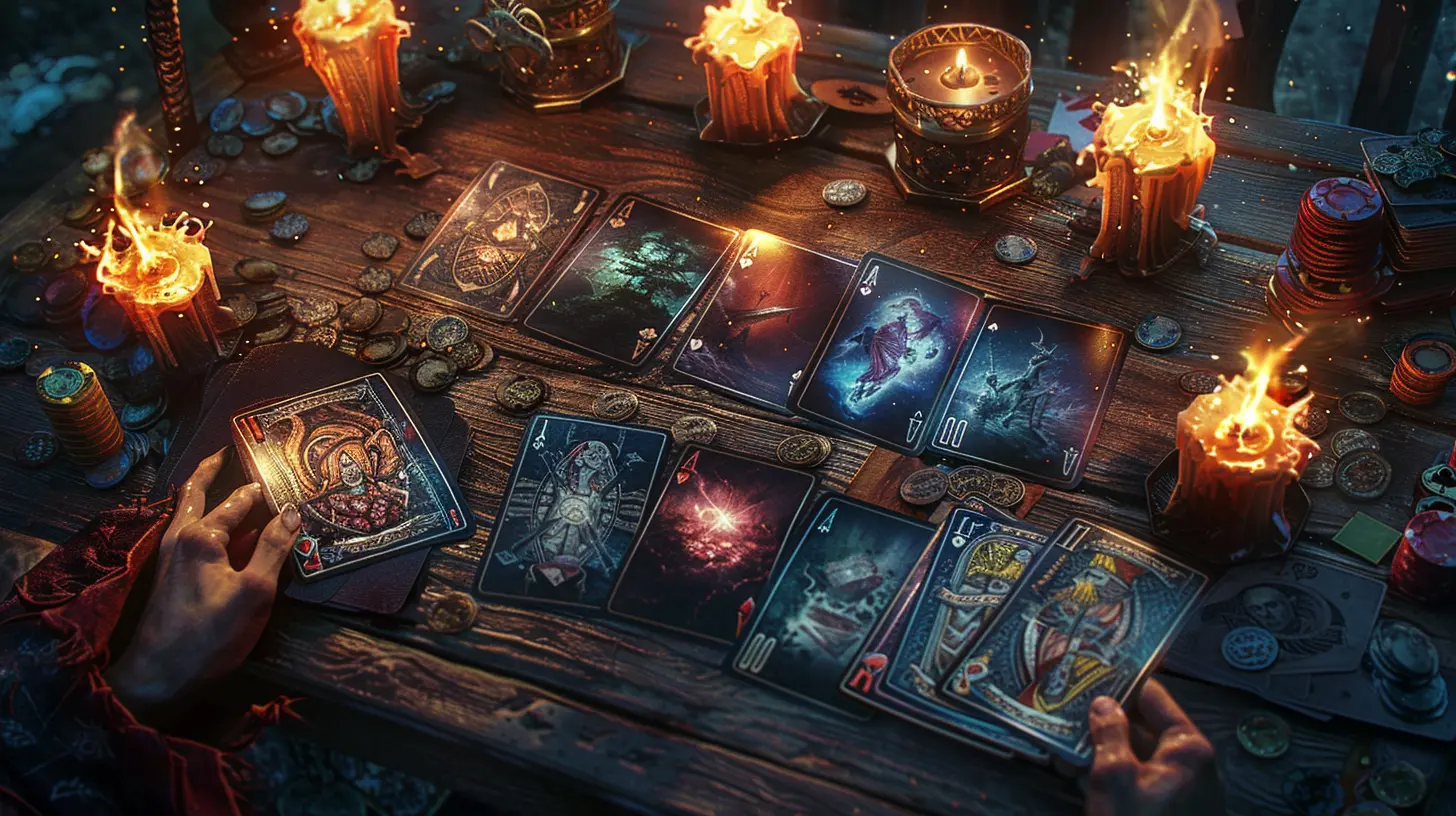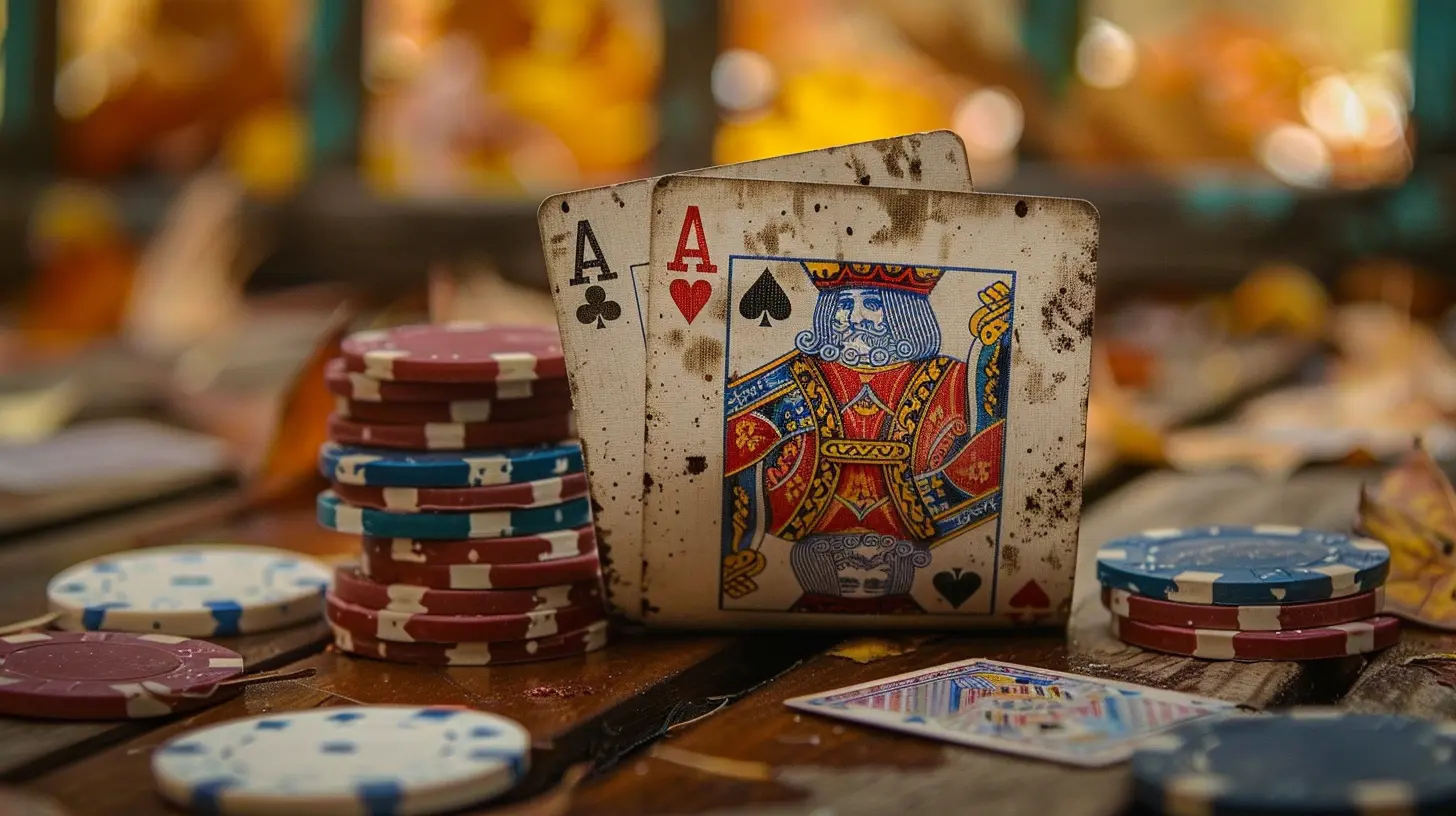12 April 2025
Ah, card games: the ultimate arena where logic meets luck, where strategy dances awkwardly with spontaneity, and where you’re one bad hand away from flipping the table and questioning all your life choices. Whether it’s poker, rummy, or some obscure card game your cousin insists is a “family tradition,” mastering the art of knowing when to go all-in or fold is crucial. And no, “going with your gut” isn’t a tactic – it's just your brain outsourcing hard work to your stomach because it's too lazy to think.
So buckle up, card slingers! We’re diving deep into the murky waters of card game tactics. Whether you fancy yourself a card shark or more of a guppy in the fishbowl of strategy, this guide will give you the tools you need to (hopefully) outsmart your opponents and only flip the table half as often. 
The Psychology of Card Games: A Subtle Form of Torture
Let’s start with the basics: Card games involve two key elements – the cards you’re dealt and the people at the table. The cards? Yeah, they hate you. But your opponents? They’re out to make your life miserable in a completely legal way. So, how do you navigate this circus of deceit?First, understand that every player at the table is either lying, bluffing, or silently panicking. Your job is to figure out which is which. And no, staring deep into someone’s soul like you're auditioning for a reality show won’t help. Instead, pay attention to the patterns: how they bet, how often they hesitate, and how they react when they win or lose. People are as predictable as a rom-com ending – you just need to tune in. 
When to Go All-In: The “Big Gesture” Play
Going all-in is like proposing marriage on the first date – it’s bold, it’s risky, and it’s either going to make you a legend or leave you crying into your cheeseburger. So, how do you know if it’s the right time to push all your chips into the center of the table?1. When the Odds Are Smooching Your Face
You’ve done the math (and if you haven’t, start learning basic stats). The pot odds are in your favor, and you’re sitting on a hand so strong it’s practically flexing its muscles. If your pair of Aces or a flush draw is grinning at you like the Cheshire Cat, it might just be time to go all-in. Just ensure you’re not blind to the possibility of somebody else holding a stronger hand. Confidence is key, but overconfidence? That’s just a bad relationship with reality.2. When You’re in a “Do or Die” Moment
Sometimes, the universe forces your hand. Maybe your stack of chips is thinner than a piece of single-ply toilet paper, and you need to make a move or risk being eaten alive by blinds. This is the “YOLO” moment of card games. Sure, you might go down in flames, but hey, at least you didn’t slowly bleed out like a melodramatic soap opera character.3. When You Wanna Make ’Em Sweat
Let’s get real for a second: Sometimes, going all-in is less about your cards and more about turning the heat up on your opponents. Got a mediocre hand but a killer poker face? Push those chips in like you mean business and watch as everyone else freaks out. Of course, if someone calls you and they’ve got the goods, well… you’re toast. But hey, at least you looked cool for 20 seconds.
When to Fold: AKA “Live to Fight Another Day”
Folding doesn’t mean you’re weak; it means you’re smart enough to know when to retreat. Think of it as the card game equivalent of canceling plans and staying home in your pajamas – sometimes, it’s the best decision you’ll ever make.1. When Your Hand Is Trash, and You Know It
Look, if your hand includes a 2 of Spades and a 7 of Hearts, do yourself a favor and fold faster than a laundry machine on spin cycle. Hopes and dreams won’t save you from the cold, hard reality of a bad hand.2. When the Table Is Too Hot to Handle
Ever been in one of those games where everybody’s betting like they’ve got a golden ticket to Willy Wonka’s factory? If the stakes are skyrocketing and you’re holding a mediocre hand, there’s no shame in bowing out. Let the high rollers duke it out while you sit back, sip your drink, and mentally pat yourself on the back for not being reckless.3. When You’re Being Bullied by a Maniac
Every table has “that guy” – the one who bets like he’s got a direct line to the card gods. Sometimes, it’s better to let the lunatic have his moment and wait for a time when you can strike back. Remember, patience is a virtue… and also a pretty decent strategy. Unless, of course, you’re just impatient by nature – in which case, good luck with that.
Recognizing Bluffs: Lies, All Lies
Ah, the bluff – the lifeblood of every card game worth its salt. A good bluff can turn a mediocre hand into a pot-winning masterpiece. But spotting a bluff? That’s where the magic happens.1. Microexpressions and Tells
Think of your opponents as badly-programmed robots. Everyone has a “tell” – a twitch of the eyebrow, a fidget with their chips, a sudden interest in looking anywhere but at you. The trick? Spot it. But don’t get too hung up on one behavior – some players fake tells just to mess with you. Card games are basically a masterclass in psychological warfare, and you’re the guinea pig.2. The Overconfident Bet
When someone bets big and bold out of nowhere, it’s worth asking yourself: Are they holding a winning hand, or are they just overcompensating for their insecurities? Either way, tread carefully. It’s like playing chicken, except instead of cars, it’s your dignity on the line.3. The Hesitation Act
Nothing screams “I’m bluffing” louder than an opponent who hesitates just a little too long. If someone acts like they’re deep in thought but then suddenly goes all-in? Yeah, call their bluff – or don’t. It’s your money, not mine.The Art of Reading the Room: Know Thy Table
Every card game has its own vibe. Maybe it’s friendly and casual, or maybe it feels like a medieval battlefield where only one person survives. Knowing when to go all-in or fold depends on more than just your hand – it’s about understanding the dynamics of the table.1. The Friendly Game
If you’re playing with friends, chances are it’s less about winning and more about having fun. But let’s be honest: Winning is still fun. Just don’t go all-in every other hand and ruin the vibe; nobody likes a try-hard.2. The High-Stakes Game
In a high-stakes game, strategy is everything. You’re not just playing with cards; you’re playing with people’s hopes and dreams (and possibly their rent money). This is where you tread lightly, fold often, and wait for the perfect opportunity to strike.3. The Chaos Table
Some games are just chaotic free-for-alls where logic goes out the window. In these cases, embrace the madness. Fold when you should, go all-in when the odds feel right, and don’t forget to laugh when everything inevitably goes sideways.Final Thoughts: Poker Face or Joker Face?
At the end of the day, knowing when to go all-in and when to fold is part science, part art, and part sheer dumb luck. You’ll win some, you’ll lose some, and you’ll waste countless hours obsessing over whether that one bluff would’ve worked if you hadn’t chickened out.But that’s the beauty of card games, isn’t it? They’re unpredictable, maddening, and occasionally brilliant. So shuffle those cards, gather your chips, and remember: The key to winning isn’t just strategy – it’s knowing when to fake confidence like you’re auditioning for a Hollywood blockbuster.






Wyatt Wells
In card games, intuition and strategy intertwine. Knowing when to risk it all or play conservatively is key. Balance courage with caution; sometimes, the bold move pays off, but patience often leads to longer-term success.
April 19, 2025 at 4:02 PM